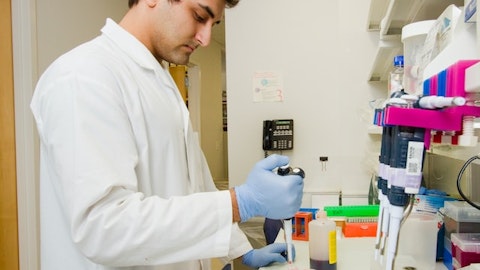There is a report on Lassa come out where there’s more incidents coming in South America, and perhaps also heading west. So who knows, but certainly NIAID, if the results are positive in animal studies then — and NIAID is interested in pursuing Lassa in West Africa, and that would be another sort of concept approach for our technology to see the different kind of virus. So, as such, company wise, I mean I defer to comment on that, but certainly that’s not a big sort of commercial aspect but through collaboration, proof of concept, and if NIAID want to do that further, why not. Would company be taking a lead role at some point, I think Corinne may comment on that, but right now we’re focused on SARS-CoV-2.
James Molloy: Okay, great. Last question is for Jeff, if I could. Jeff, outbacks been kind of turning down last few quarters. I darn you guys are doing a good job, shepherding cash. Is this the level we should expect going forward or we start seeing OpEx perhaps bumping up going through 2024?
Jeffrey Church: Yeah, we anticipate our cash utilization in the sort of the low 4 million a quarter range and we’ll manage to that. The big driver will be the Phase I/II study. But as we mentioned, the OVATION 2 is fully enrolled, we’re doing just a follow up on that, and then the breakthrough cancer program with the AVASTIN is being funded largely by their foundation. So we’re going to manage to a quarterly cash utilization of $4 million to $4.25 million.
James Molloy: Got it. Thank you for taking the questions.
Operator: The next question comes from Kemp Dolliver from Brooklyn Capital Markets. Please go ahead.
Kemp Dolliver: All right. Thank you, and good morning. So I have a couple of questions about the IMNN-001 trial in combination with AVASTIN. First when you expect to activate Daner-Farber and MSK?
Corinne Le Goff: Thank you, Kemp. Yes, we have not announced it yet, but we’re expecting that they’ll be — at least MSK will be on board pretty soon. Khursheed, do you want to give a bit more color to my answer?
Khursheed Anwer: Yes. Exactly. Corinne is right, with data of mice initiation, call with them we did a couple of weeks ago, we did respond to their IRB question standard. So I think they could be very soon activated. The other one is Johns Hopkins for Phase I part but Daner-Farber had from the very beginning, they would participate from the Phase II part of the trial. So, as Corinne said, MSK should be — there’s no hiccups expected, we shouldn’t be making that announcement, they should be coming on board. A lot of paperwork has been completed with them. It is basically setting up the contract all the different approvals from their committees. We have made good headway in that direction, so MSK is very likely coming up soon.
Kemp Dolliver: That’s great. Thank you. And this trial is using, I believe, carboplatin as in the comparator arm and that’s been in short supply. How have you been able to manage that in terms of a — both availability, but then also cost?
Khursheed Anwer: Yeah, I mean, that’s a good question. We did run into this issue back in 2012 with [Indiscernible], if you remember, that was a big issue. But no, we haven’t — I mean, the centers that we are doing our studies are really big names. So, the investigators in MD Anderson has not brought that to attention in terms of the cancer center having any deficiency. You’re right, this chemotherapy is carboplatin and paclitaxel. So we haven’t really heard from the sites yet certainly, these big centers have any deficiency issues caused by the standard of care normally given to patients. But cisplatin is another, of course, a platinum based drug is used. So I’m not forecasting that you may use cisplatin, but haven’t heard anything about any problem with these cancer centers.
So I don’t anticipate, but cisplatin is always available there as another platinum drug. So I probably don’t want to say anything over here because you did point out something and we haven’t been really told that will be a concern with these centers, maybe a lot of small centers perhaps that could be an issue as there was with [Indiscernible] in about 25 sites or so. So here about four sites so far in name, so I don’t know. I’ll look into that. Really, we haven’t been told by the sites yet any issue down the road, certainly.
Corinne Le Goff: Yeah. And the costs are paid by Break Through Cancer Foundation.
Kemp Dolliver: Right. So, two questions and I apologize, the first one is going to require you to repeat some information. But I just want to be sure I understand — understood for this trial, the timing of anticipated completion of enrollment and availability of — the first set of interim data you’ll provide because I think the line was breaking up and wasn’t clear how those line up together.
Corinne Le Goff: Right, so I will start and I will let Khursh continue. So, we anticipate that enrollment will be done cautiously for the first phase of the trial, which is the safety analysis of the combination of 001 in AVASTIN, at least that’s what the investigators are telling us. And, of course, as more centers come on board, you will see an acceleration in the enrollment. But Khursheed, please, if you could answer the second part of the question.
